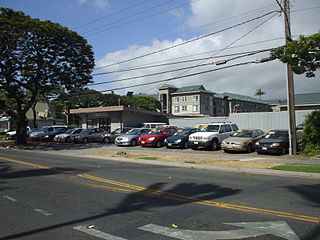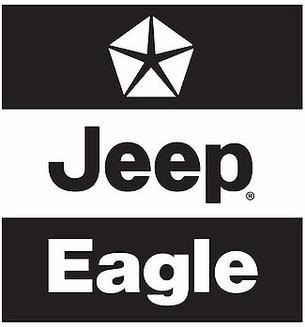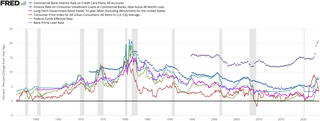Related Research Articles

A car dealership, or car dealer, is a business that sells new or used cars, at the retail level, based on a dealership contract with an automaker or its sales subsidiary. Car dealerships also often sell spare parts and automotive maintenance services.
Auto Trader Group plc, commonly known as Auto Trader, is a British automotive online marketplace and classified advertising business. It enables the buying and selling of new and used vehicles by private sellers and trade retailers. Auto Trader is listed on the London Stock Exchange trading under the ticker symbol AUTO, and is a constituent of the FTSE 100 Index.

Roy Abernethy was an executive in the American automobile industry, serving as CEO of American Motors Corporation (AMC) from February 1962 to January 1967. Before his tenure at AMC, Abernethy had been with Packard Motors and Willys-Overland. Abernethy replaced George W. Romney, who resigned from AMC to become Governor of Michigan.

A used car, a pre-owned vehicle, or a secondhand car, is a vehicle that has previously had one or more retail owners. Used cars are sold through a variety of outlets, including franchise and independent car dealers, rental car companies, buy here pay here dealerships, leasing offices, auctions, and private party sales. Some car retailers offer "no-haggle prices," "certified" used cars, and extended service plans or warranties.

Jeep-Eagle was the name of the automobile sales division created by the Chrysler Corporation after the US$2 billion takeover of American Motors Corporation (AMC) in 1987. The division marketed a variety of vehicles until 1997.
The Society of Motor Manufacturers and Traders (SMMT) is the trade association for the United Kingdom motor industry. Its role is to "promote the interests of the UK automotive industry at home and abroad."

The automotive industry in China has been the largest in the world measured by automobile unit production since 2008. Since 2009, annual production of automobiles in China accounted for more than 32% of worldwide vehicle production, exceeding both that of the European Union and that of the United States and Japan combined. As of at least 2024, China is the world's largest automobile market both in terms of sales and ownership.
OMVIC is a council that regulates motor vehicle sales, administers and enforces the Motor Vehicle Dealers Act on behalf of the Ontario Ministry of Government and Consumer Services (MGCS) in Ontario. OMVIC's mandate is to maintain a fair and informed marketplace, by protecting the rights of consumers while enhancing the professionalism of the industry, and ensuring fair, honest, and open competition for registered motor vehicle dealers.
The Retail Motor Industry Federation (RMI) represents the interests of motor industry operators in England, Wales, Northern Ireland and the Isle of Man providing sales and services to motorists and businesses. It does not represent businesses in Scotland, which are represented by the independent Scottish Motor Trade Association.

The National Automobile Dealers Association (NADA) is an American trade organization representing nearly 16,500 franchised new car and truck dealerships, both domestic and foreign. Established in 1917, the organization is based in Tysons Corner, Virginia. As the automotive retail industry's primary trade association, NADA monitors federal legislation and regulation affecting dealerships and publishes forecasts and reports about industry trends. American Truck Dealers, established in 1970, is a division of NADA representing nearly 1,800 heavy- and medium-duty truck dealerships throughout the United States.

Auto auctions are a method of selling vehicles based on an auction system. Auto auctions can be found in most countries and are usually exclusive to licensed automobile dealers. In a few countries, such as Japan, auto auctions are well known and used by most residents.

Vehicle recycling is the dismantling of vehicles for spare parts. At the end of their useful life, vehicles have value as a source of spare parts and this has created a vehicle dismantling industry. The industry has various names for its business outlets including wrecking yard, auto dismantling yard, car spare parts supplier, and recently, auto or vehicle recycling. Vehicle recycling has always occurred to some degree but in recent years manufacturers have become involved in the process. A car crusher is often used to reduce the size of scrapped vehicles for simplified transportation to a steel mill.

Car finance refers to the various financial products which allow someone to acquire a car, including car loans and leases.
The Motor Vehicle Owners' Right to Repair Act, sometimes also referred to as Right to Repair, is a name for several related proposed bills in the United States Congress and several state legislatures which would require automobile manufacturers to provide the same information to independent repair shops as they do for dealer shops.
The Automobile Manufacturers Association was a trade group of automobile manufacturers that operated under various names in the United States from 1911 to 1999. It was replaced by the Alliance of Automobile Manufacturers.
On September 26, 2011, California Governor Jerry Brown signed California Law AB 1215 into law. Authored by Bob Blumenfield, the legislation accomplished three goals: (1) increasing the fees that California car and truck dealers can charge for licensing, (2) requiring dealers to use Electronic Titling and (3) governing how automobile dealers disclose previously damaged used cars. The law went into effect on July 1, 2012.

The Alliance for Automotive Innovation (AAI) is a Washington, D.C.-based trade association and lobby group whose members include international car and light duty truck manufacturers that build and sell products in the United States.
The electric car company Tesla, Inc. has faced dealership disputes in several U.S. states as a result of local laws. In the United States, direct manufacturer auto sales are prohibited in many states by franchise laws requiring that new cars be sold only by independent dealers.
A pre-purchase inspection is an independent, third-party professional service that evaluates a vehicle’s condition before a purchase offer is made. Consumer protection organizations such as the Federal Trade Commission, the American Bar Association, insurance companies, and states recommend an independent pre-purchase inspection. The prospective buyer hires a qualified evaluator who examines the target vehicle for defects, hidden damage, maintenance history, and safety, then typically provides a written evaluation report. The service results in factual information that the prospective buyer uses as decision support for the vehicle purchase. Unless the vehicle is unsafe to drive, the evaluator does not provide a purchase recommendation.

The automotive industry in the Philippines is one of the largest in the Asia-Pacific region, with approximately 441.4 thousand vehicles sold in 2023. Most of the vehicles sold and built in the Philippines are from foreign brands. For the most part, the Philippines is dominated by Japanese automobile manufacturers like most of its ASEAN neighbors. The automobile production in the country is covered under the Philippine Motor Vehicle Development Program implemented by the Board of Investments. In addition, there are also a small number of independent firms who assemble and fabricate jeepneys and other similar vehicles, using surplus engines and drivetrain parts mostly from Japan.
References
- ↑ "History of NIADA" . Retrieved 4 May 2011.
- ↑ "NIADA Education".